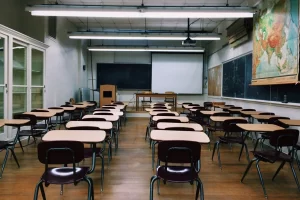
Your source for local & national Educational News!
This month's newsletter features information on breezing through TEA’s New Virtual or Hybrid School Application for the 2022 - 2023 School Year, as well as information on getting your district through a Special Education Due Process Hearing.
Breezing through TEA’s New Virtual or Hybrid School Application for the 2022-2023 School Year
By: Paige Bostic

Overview
Learning and its process have evolved at compound speed since the global pandemic that shook up our norms. We went from an in-person model to a virtual one overnight. This commenced a long line of “firsts” and “novel” proving the flexibility of Texas Schools and their resilient staff, as they undertook to create something out of nothing to serve the children of Texas.
During the 86th Legislative Session, SB 15 was passed to help Texas schools facilitate the safety needs of their learners and still receive ADA funding for up to ten percent of a LEAs virtual or hybrid learning populations. SB 15 went into effect September 1, 2021, and is set to sunset on September 1, 2023, unless otherwise extended by law over the course of the Texas 87th Legislative session which will commence in January 2023.
The New Virtual or Hybrid School Application allows LEAs a chance to create a virtual or hybrid campus to continue to meet the needs of learners who thrived in the virtual or hybrid model, created at the start of the global pandemic.
Eligible Applicants
- Texas LEAs that commit to running a virtual or hybrid campus for the 2022-2023 school; and
- Who meet the requirements outlined in SB 15 which are:
- An overall District Rating of C or higher for the 2018-19, or the year the latest performance rating was given.
- Note: LEAs that do not have a prior performance rating, for example, LEAs established in school years 2019-20 or 2020-21, are eligible to launch local remote learning under SB 15 but will be subject to the performance rating constraint once a rating is assigned in a future school year
- Include at least one STAAR-assessed grade level among the grade levels for which local remote learning is offered or include a complete high school program, including each course for which an end-of-course assessment is required to be administered.
- Provide families an on-campus option. Local remote learning may not be the sole option offered to families, in general or for any given day that remote instruction is offered.
- Administer assessments to students enrolled in local remote learning in the same manner as students learning on campus. LEAs must also periodically assess students in the remote learning program to assess progress.
- Provide students enrolled in remote learning the ability to participate in any extracurricular activity sponsored or sanctioned by the LEA or by the University Interscholastic League in the same manner as other students.
- Meet the needs of and comply with all relevant federal and state law and policy with respect to students with disabilities and English learners who are enrolled in a remote program.
- Provide professional development on virtual instruction to all teachers delivering instruction in a local remote learning program.
- Ensure that teachers delivering instruction in a full-time remote program have not been coerced in any way to take their full-time remote learning instruction position
- Ensure teachers are not delivering instruction concurrently; concurrent instruction is instruction delivered to both on-campus and remote learners during the same class period, at the same time.
- An overall District Rating of C or higher for the 2018-19, or the year the latest performance rating was given.
What does the District Need to Know Up-Front?
- The Deadline for the Virtual or Hybrid School Application 2022-2023 School year is May 20, 2022
- The application process is two-fold. (1) An LEA must submit the virtual or hybrid school application (including evidence of LEA Board Approval) to remote.learning@tea.texas.gov; and (2) Upon TEA approval of step one, complete a County District Campus Number (“CDCN”) Request Form and submit the form to AskTED@tea.texas or CharterAskTED@tea.texas.gov.
- All Virtual or Hybrid School Applications are graded on a rubric. The rubric can be found at https://tea.texas.gov/sites/default/files/new-virtualor-hybrid-school-approval-rubric.pdf
- Your new virtual or hybrid campus must comport with the requirements set out in SB 15. https://tea.texas.gov/sites/default/files/senate-bill-15- overview.pdf
Important Due Dates:
May 20. 2022
The deadline to complete the Virtual or Hybrid School Application 2022-2023
school year. This application must include Board Approval.
March 28- May 27, 2022
The period in which virtual interviews MAY be conducted, pending a request
from TEA. A virtual interview is not a requirement for all applicants.
May 31, 2022
The last day to receive approval from TEA regarding the 2022-2023 Virtual or
Hybrid School Application.
July 29, 2022
The deadline to apply for a County District Campus Number.
September 1, 2022
LEAs provide a formal commitment to TEA to launch their new virtual or hybrid
campus.
September 1, 2023
Virtual or Hybrid School CDCN expires unless extended by legislative action in
the Texas 87th Legislative Session.
If you would like additional support in navigating the Dyslexia Handbook 2021 Update,
please call PaigeBostic at (512) 662-7415 or email me at pbostic@deugenelaw.com
Superintendent's Corner

This month in our Superintendent’s Corner:
How to Get Your District Through a Special Education Due Process Hearing?
Why Due Process Matters?
A due process hearing is one of the many procedural safeguards afforded by the Individuals with Disabilities Education Act (“IDEA”). These safeguards were created to protect the rights of children with disabilities and their parents to ensure that all children have a Free Appropriate Public Education (“FAPE”). Other safeguards include: requirements for prior written notice, procedural safeguard notice, mediation, resolution sessions, appeals, discipline and the age of majority.
What is a Due Process Hearing?
A due process hearing is the primary vehicle for resolving conflict between the parents of children with disabilities and the District. Due process hearings may properly address conflicts regarding evaluation, identification, placement, or provision of FAPE to a child with a disability. 34 CFR 300.507.
Who May Request a Due Process Hearing?
A Parent or District (i.e., District Representative or District Designee) may request a due process hearing. IDEA requires that the party asserting their right to a due process hearing provide a complaint to the party alleged to be
bad actors. IDEA uses a wide lens to define the word parent. A teacher with the District has no standing to request a due process hearing.
How to Request a Due Process Hearing?
In Texas, due process hearings are requested via TEA’s Office of the General Counsel.
What are the Prerequisites Before a Due Process Hearing?
1. A due process complaint must be filed with TEA’s Office of the General Counsel.;
2. The complaint must be served to the non-aggreived party. There is no formal structure for this service, as it does not follow the regulations of a formal legal complaint with a court;
3. The resolution period commences, in which the District must set a resolution meeting; and
4. If the matter is still unresolved after the resolution period, a due process hearing will take place.
What is a Resolution Meeting?
The District is obligated to hold a resolution meeting within 15 calendar days of receipt of a complaint. The purpose of a resolution meeting is for the District and the Parent of the child to discuss issues raised in the complaint , so that
the District has the opportunity to resolve the dispute before the initiation of the due process hearing.
Due Process Hearing Timeline:
Notice of Complaint Sent
The notice is sent to the non-aggrevied party once filed with TEA.
Notice is Received
The District must convene a resolution meeting within 15 days of receipt of
notice.
Resolution Meeting
If the non-aggrieved party has not resolved the due process complaint to the
aggrieved party’s satisfaction within 30 days of receipt of the original complaint,
then a Due Process Hearing occurs.
Due Process Hearing
A formal proceeding where both sides present evidence and the results are
declared in a binding legal document.
Eugene & Associates Monthly Spotlight

Check back next month for Eugene & Associates spotlights and news!

WHY CHOOSE US?
Eugene & Associates, PC, is a boutique law firm specializing in education law and regulation, public finance, renewable energy and nonprofits. At Eugene & Associates, PC, we strive to bring added value to our client partners through sound legal advice, responsive business practices and a personal touch to achieve successful business outcomes.




